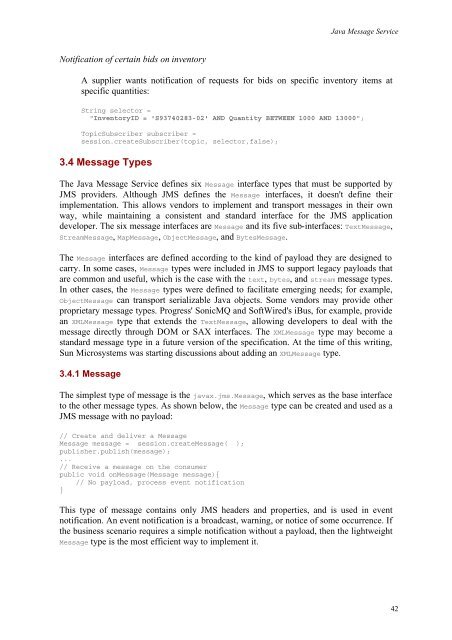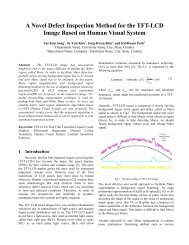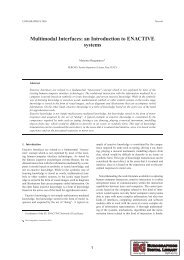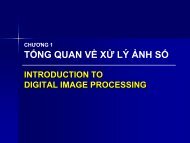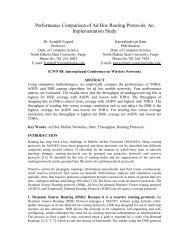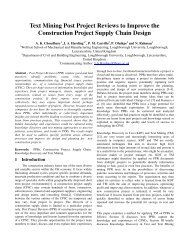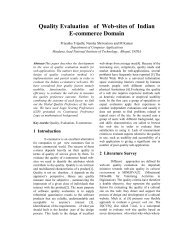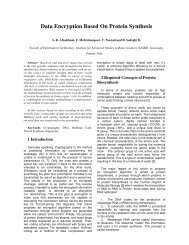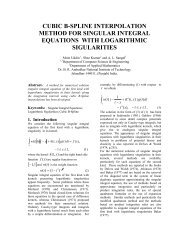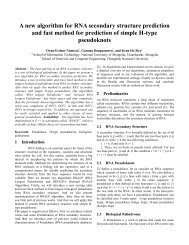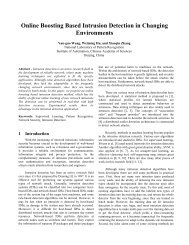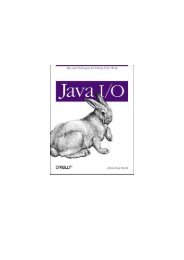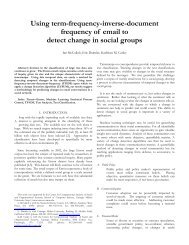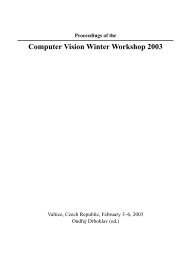O'Reilly - Java Message Service
O'Reilly - Java Message Service
O'Reilly - Java Message Service
Create successful ePaper yourself
Turn your PDF publications into a flip-book with our unique Google optimized e-Paper software.
Notification of certain bids on inventory<br />
<strong>Java</strong> <strong>Message</strong> <strong>Service</strong><br />
A supplier wants notification of requests for bids on specific inventory items at<br />
specific quantities:<br />
String selector =<br />
"InventoryID = 'S93740283-02' AND Quantity BETWEEN 1000 AND 13000";<br />
TopicSubscriber subscriber =<br />
session.createSubscriber(topic, selector,false);<br />
3.4 <strong>Message</strong> Types<br />
The <strong>Java</strong> <strong>Message</strong> <strong>Service</strong> defines six <strong>Message</strong> interface types that must be supported by<br />
JMS providers. Although JMS defines the <strong>Message</strong> interfaces, it doesn't define their<br />
implementation. This allows vendors to implement and transport messages in their own<br />
way, while maintaining a consistent and standard interface for the JMS application<br />
developer. The six message interfaces are <strong>Message</strong> and its five sub-interfaces: Text<strong>Message</strong>,<br />
Stream<strong>Message</strong>, Map<strong>Message</strong>, Object<strong>Message</strong>, and Bytes<strong>Message</strong>.<br />
The <strong>Message</strong> interfaces are defined according to the kind of payload they are designed to<br />
carry. In some cases, <strong>Message</strong> types were included in JMS to support legacy payloads that<br />
are common and useful, which is the case with the text, bytes, and stream message types.<br />
In other cases, the <strong>Message</strong> types were defined to facilitate emerging needs; for example,<br />
Object<strong>Message</strong> can transport serializable <strong>Java</strong> objects. Some vendors may provide other<br />
proprietary message types. Progress' SonicMQ and SoftWired's iBus, for example, provide<br />
an XML<strong>Message</strong> type that extends the Text<strong>Message</strong>, allowing developers to deal with the<br />
message directly through DOM or SAX interfaces. The XML<strong>Message</strong> type may become a<br />
standard message type in a future version of the specification. At the time of this writing,<br />
Sun Microsystems was starting discussions about adding an XML<strong>Message</strong> type.<br />
3.4.1 <strong>Message</strong><br />
The simplest type of message is the javax.jms.<strong>Message</strong>, which serves as the base interface<br />
to the other message types. As shown below, the <strong>Message</strong> type can be created and used as a<br />
JMS message with no payload:<br />
// Create and deliver a <strong>Message</strong><br />
<strong>Message</strong> message = session.create<strong>Message</strong>( );<br />
publisher.publish(message);<br />
...<br />
// Receive a message on the consumer<br />
public void on<strong>Message</strong>(<strong>Message</strong> message){<br />
// No payload, process event notification<br />
}<br />
This type of message contains only JMS headers and properties, and is used in event<br />
notification. An event notification is a broadcast, warning, or notice of some occurrence. If<br />
the business scenario requires a simple notification without a payload, then the lightweight<br />
<strong>Message</strong> type is the most efficient way to implement it.<br />
42


